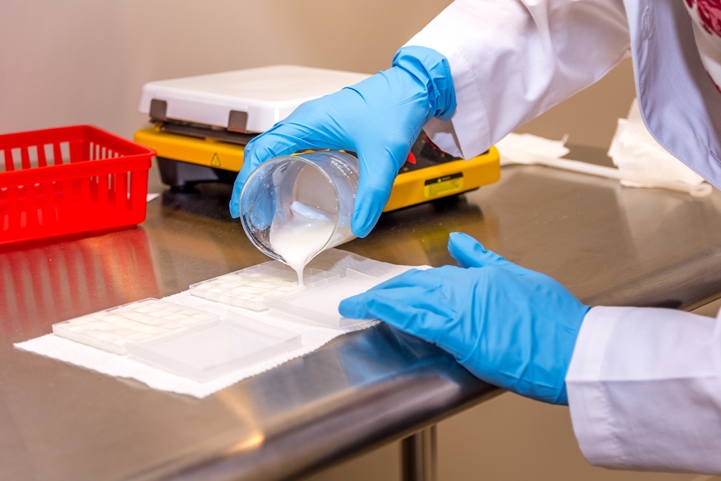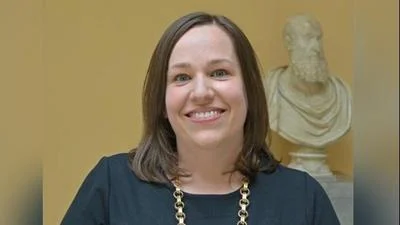University of Maryland, Baltimore issued the following announcement on Dec. 5.
Ashlee Mattingly, PharmD, BCPS, assistant professor in the Department of Pharmacy Practice and Science at the University of Maryland School of Pharmacy (UMSOP), has been awarded a three-year, $2.2 million federal grant to investigate the clinical use of bulk drug substances (active ingredients) that have been nominated for use in compounding by outsourcing facilities.
The research will assist the U.S. Food and Drug Administration (FDA) in its efforts to develop a list of bulk drug substances that outsourcing facilities can use in compounding under the Federal Food, Drug, and Cosmetic Act.
“Compounded drugs serve an important role for patients whose medication needs cannot be met by an FDA-approved drug product, such as patients who have an allergy and need a medication to be made without a certain dye,” Mattingly says. “However, poor-quality compounded drugs have caused serious harm in the past. Our research will examine how drugs compounded with certain bulk drug substances have been used historically, as well as how they are currently used in clinical practice, which will help the FDA determine whether these substances should be included on its list of bulk drug substances that outsourcing facilities can use in compounding.”
he need for this project arose from an incident that occurred in 2012 in which an outbreak of fungal meningitis that led to more than 60 deaths and 750 cases of infection across the United States was linked to contaminated steroid injections compounded by a facility in Massachusetts. To help prevent similar tragedies from occurring in the future, Congress passed an amendment to the Federal Food, Drug, and Cosmetic Act that gave the FDA more authority to regulate and monitor the manufacturing of compounded drugs.
The amendment, known as the Drug Quality and Security Act of 2013, established a new category of compounders known as outsourcing facilities, which are registered with the FDA and operate under the direct supervision of a licensed pharmacist. These facilities can only compound using bulk drug substances if the substance is used to compound a drug on the FDA’s drug shortage list, or if it appears on a list that will be developed by the FDA of bulk drug substances for which there is a clinical need.
Stephen Hoag, PhD, professor in the Department of Pharmaceutical Sciences and director of the Applied Pharmaceutics Lab at UMSOP, joins Mattingly as a collaborator on this project. Hoag explains: “It’s a difficult balancing act with which the FDA has been tasked. Its scientists and reviewers want to make these medications available for the patients who need them, but they must also take certain precautions to make sure that the medications are compounded and used properly. We will help them collect the information they will need to make informed decisions about which substances should be compounded, as well as which substances should not be compounded.”
The grant is part of an ongoing partnership between the University of Maryland, Baltimore; the University of Maryland, College Park; and the FDA through the University of Maryland Center of Excellence in Regulatory Science and Innovation (M-CERSI), which focuses on modernizing and improving the ways drugs and medical devices are reviewed and evaluated. James Polli, PhD, the Shangraw/Noxell Endowed Chair in Industrial Pharmacy and Pharmaceutics at UMSOP and co-principal investigator for M-CERSI, will partner with Mattingly and Hoag on this project.
“The goal of M-CERSI is to bring together researchers from across the University of Maryland to assist the FDA with a wide range of regulatory science issues,” Polli says. “We want its scientists to be best informed when making decisions that will affect patients, providers, researchers, and manufacturers across the country. Through our involvement in this project, we are not only helping to ensure the availability of bulk drug substances for compounding, but also making sure that patients receive medications that are the highest possible quality for their conditions.”
The project will include an in-depth review of clinical practice guidelines, published literature, and other sources focused on bulk drug substances, which can refer to any material that acts as an active ingredient when used to manufacture, process, or package a medication. Some of the bulk drug substances that Mattingly and her team have been tasked with evaluating include alpha lipoic acid (a supplement often used by individuals with diabetes and peripheral neuropathy) and glycolic acid (a substance used to treat conditions affecting the skin, such as scarring and hyperpigmentation).
Mattingly and her team will work together, while leveraging their individual expertise in pharmacy practice and pharmaceutical sciences, to determine whether there is a clinical need for each of the more than 200 substances that warrants its inclusion on the FDA’s list. Once the research is complete, the team will prepare a report summarizing its findings, which the FDA will use to help inform its decisions regarding whether to include the substances on the list of bulk drug substances that outsourcing facilities are permitted to use in compounding.
“This project is really about learning as much as we can about each substance that has been nominated for inclusion on the FDA’s list,” Mattingly says. “Our goal is to help protect patients against poor-quality compounded drugs without sacrificing their access to those important products for which they have a medical need.”
Original source can be found here.

Source: University of Maryland, Baltimore


 Alerts Sign-up
Alerts Sign-up